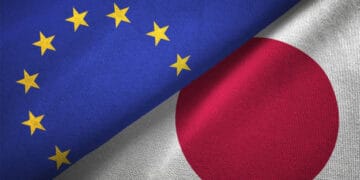Representing the EU, the Belgian Presidency of the Council has signed a protocol to incorporate provisions on cross-border data flows into the existing agreement between the EU and Japan for an Economic Partnership.
The protocol aims to enhance legal certainty, ensuring that data transfers between the EU and Japan are not obstructed by unjustified data localization measures. It also seeks to facilitate the free flow of data in accordance with the data protection and digital economy regulations of both the EU and Japan.
Background and Next Steps:
- On September 26, 2022, the Council approved negotiating directives for the Commission to engage in negotiations for the inclusion of provisions on cross-border data flows in the EU-Japan Economic Partnership Agreement.
- Negotiations were tentatively concluded on October 28, 2023.
- On December 1, 2023, the Commission submitted proposals for Council decisions regarding the signature and conclusion, on behalf of the EU, of the protocol amending the EU-Japan Economic Partnership Agreement concerning the free flow of data.
- On January 29, 2024, the Council adopted the decision to sign the protocol, which includes provisions on cross-border data flows in the EU-Japan Economic Partnership Agreement. Additionally, the Council decided to submit the decision to ratify the protocol to the Parliament for approval.
- Once Japan ratifies the agreement and both sides complete their internal procedures, the agreement can come into effect.
Once Japan ratifies the agreement and both sides complete their internal procedures, the agreement can come into effect. This will pave the way for enhanced cooperation and smoother data exchanges between the EU and Japan, benefiting businesses, consumers, and other stakeholders in both regions.
The inclusion of provisions on cross-border data flows underscores the commitment of the EU and Japan to promote a conducive environment for digital trade and economic collaboration. By ensuring the free flow of data while upholding robust data protection standards, the protocol seeks to foster innovation, economic growth, and mutual trust between the two trading partners.
As the agreement progresses towards ratification and implementation, stakeholders will closely monitor its impact on various sectors and assess how it aligns with broader objectives related to trade, technology, and regulatory harmonization.
Find the latest supply chain report news at The Supply Chain Report. For international trade tools, see ADAMftd.com.
#EUEconomicPartnership #JapanDataFlows #DigitalTrade #DataProtection #CrossBorderData #DataLocalization #Innovation #EconomicGrowth #RegulatoryHarmonization #DigitalEconomy
















